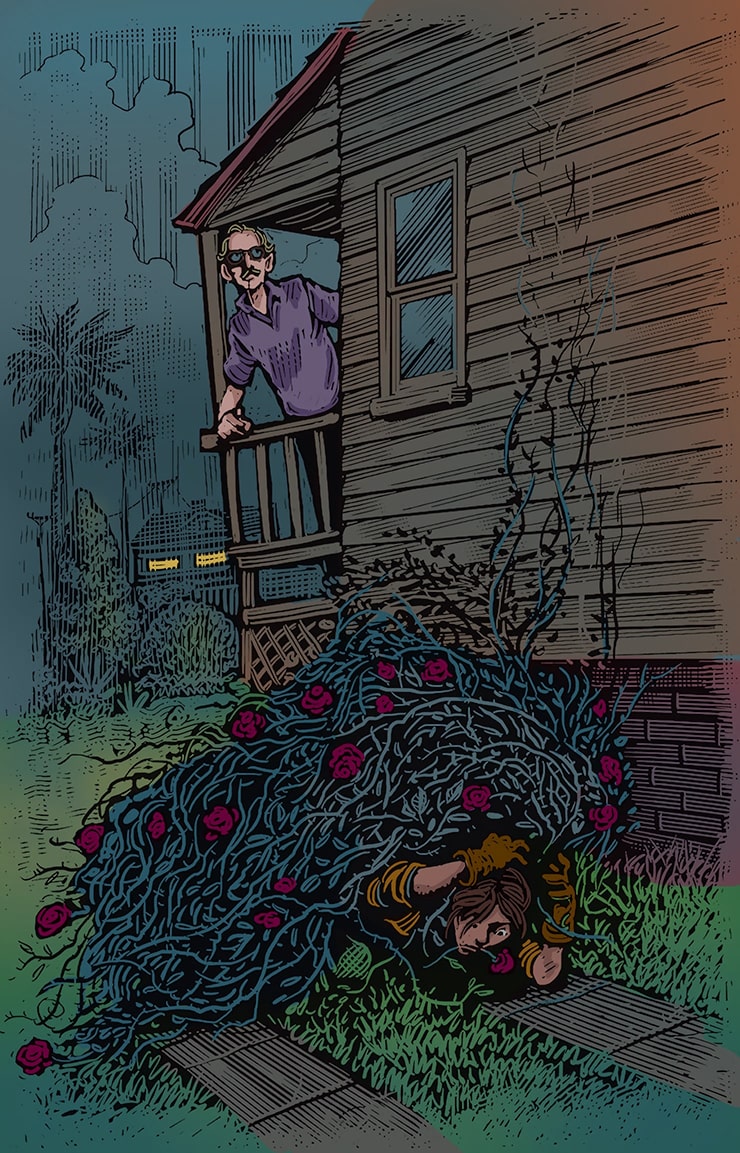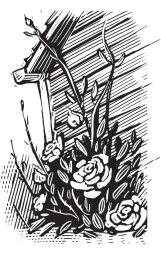Read by Matilda Longbottom
Outside my Dad’s bedroom window in our little house in Paramount, California, grew an old rosebush that covered most of the back wall and the two windows looking out over the yard. The rose was old: five petals, white tipped, pale pink, and too plain for most people to consider pretty. It was not a heavenly perfumed Alba, which I think the roses described in Nathaniel Hawthorne’s The House of Seven Gables might have been (the novel I was reading when we moved into the house). It wasn’t a hybrid tea with perfect color and form and scent; those roses bloomed in just about every other yard on the street. Instead, ours was a wild rose—beautiful in its abundance and joyous in its self-sufficiency. It seemed to want no more than what it had: good soil, good light, and enough rain.
When we first saw the rose, it had completely overgrown that part of the house. More thorns than flowers, it was lapping up on the roof as if it intended to keep going right on over to the other side. There were still boxes to be unpacked in the living room, and we hadn’t found the silverware when my dad said, “Get some gloves and pull it down.”
Sure, that looked easy.
I was all of five feet, six inches tall, and this thing was a thorny green tsunami set to crash down on me—which is just what it did. I crouched on the ground, head buried under my arms, as it came down in a solid sheet and arched over me. Finally, all those third grade duck-and-cover drills paid off. I crawled out through the tunnel of deadwood and red-orange rose hips to find Dad standing on the back porch looking at me.

“Any trouble with it?”
I knew the details would end up as a family story, and I could already hear the opening line, “Did you ever hear about the day a giant rosebush attacked…”
There was no way I was going to admit to being bested by a plant, so I dusted off my sleeves, pulled my shoe back on, and said, “Nope.”
It was October when we took the bush down to three of the best and strongest canes, watered in some manure, threw down some cedar mulch, and then forgot all about it until spring, when pale green buds appeared on the three canes. Anyone else would have trimmed the suckers away, but not my dad. “Let it go, it’s a wild thing.” It was his philosophy for raising children, too. Feed them and love them and let them go, they are wild things.
We lived in that little house for three years, and each year the rose was cut back and fed and then left to go wild. I took a cutting and put it in a jar on the kitchen window of our next house, but it mildewed and died within the week. And that, for me, was the end of that rose.
There would be other roses, of course; there must be roses—a hedge of pink Simplicities running the length of a driveway, white teas and yellow teas and the lemony-perfumed Blue Girls and Angel Faces grown in containers on the patio, an orphaned unidentified rose in a one-gallon container bought for fifty cents which turned out to be a very pretty climbing Joseph’s Coat, and my sister’s one and only favorite red—Mister Lincoln, a large, strong, deep-red and black-tipped hybrid tea.

But always and forever there is the memory of that wild rose, its pale pink flowers beautiful against the peeling white paint of the clapboard house, its fingers clinging to the edge of the rain gutters, its new pale green shoots aiming for the roof, left to go wild. ❖


 Previous
Previous

